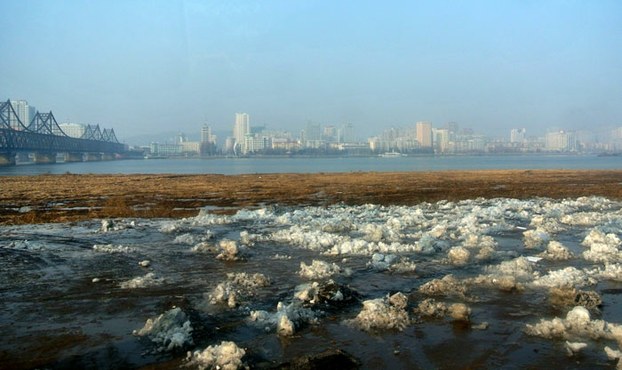As North Korea beefs up security more people have to strip down
| Publisher | Radio Free Asia |
| Publication Date | 4 August 2016 |
| Cite as | Radio Free Asia, As North Korea beefs up security more people have to strip down, 4 August 2016, available at: https://www.refworld.org/docid/57d8fd3514.html [accessed 21 May 2023] |
| Disclaimer | This is not a UNHCR publication. UNHCR is not responsible for, nor does it necessarily endorse, its content. Any views expressed are solely those of the author or publisher and do not necessarily reflect those of UNHCR, the United Nations or its Member States. |
2016-08-04
 This undated file photo shows the China's northeastern border city of Dandong in the distance from the North Korean border town of Siniuju. AFP
This undated file photo shows the China's northeastern border city of Dandong in the distance from the North Korean border town of Siniuju. AFP
As North Korea ramps up security along the border with China, business travelers are being forced to do the "full monty" as the strip search is becoming a common procedure, sources tell RFA's Korean Service.
"Even though we don't have a big load, the body search has become excessive," one Chinese peddler told RFA. "It takes a minimum of three to four hours, but often more than five hours to go through security procedure."
That procedure has become more complicated since Kim Jong Un became North Korea's supreme leader, and now authorities there are often forcing foreign business people to bare all, the sources tell RFA.
"I recently experienced humiliation during the security search when I was traveling from Sinuiju City (North Korea) to Dandong City (China)," said the Chinese peddler, who spoke on condition of anonymity.
"I showed all my belongings, my hair pin and everything during the procedure, but the metal detector's alarm continued to go off," she added. "I had to go into a guest room and go through a metal detector without wearing a single thread of clothing."
Even though she was completely naked, the metal detector's alarm continued to sound, she said.
'Did you swallow gold?'
"The security guards would glare and mumble: 'Did you swallow gold?' or 'The machine is broken,' until the inspection was finished," said the source. "My experience is only one of many examples. There are more people experiencing this type of humiliation during the departure procedure, which I think is a violation of human rights."
A Chinese businessman also told RFA he'd been subjected to the strip search.
"The guards excessively go through our belongings, bags and other items when traveling in and out of North Korea," he told RFA on condition of anonymity. "The guards ban us from carrying any books or printouts, no matter what the content is."
He added: "The cellphone search is a very complicated process, but I have never experienced such an excessive body search that required me to take off my underwear."
The search has become such a routine that Chinese travel agents attempt to educate tourists in advance. Not only do they give tourists a list of items they should not carry in North Korea, but they also put the travelers through a preliminary inspection just to make sure.
Chinese authorities are also ramping up the search for any illicit cargo that travels between North Korea and China.
A trader in Dandong City, China told RFA: "Sending 'apple rice' to North Korea has become impossible."
Chinese rice packed in an apple box, instead of a rice bag is known as 'apple rice,' explained the source.
"It's a symbolic term used for goods that are sent to North Korea that is packaged with different items than those displayed on the outside packaging," the source said. "These packages are loaded on vans for trading."
If a trader is caught during the inspection, not only do they pay a fine, but their goods are not permitted to clear security.
Reported by Joonho Kim for RFA's Korean Service. Translated by Jackie Yoo. Written in English by Brooks Boliek.
Link to original story on RFA website
